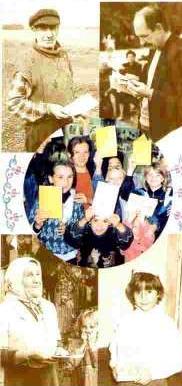|
SAMOIEDE.
"THE term "Samoiede," or "Samoyede," or
"Samojede," is difficult to interpret. It
means properly
"eaters of themselves;" but this etymology cannot be
good, since those tribes have never been
anthropophagi. In some works written in
Russian, the Samoyedes are also called
"Syrojedes," eaters of
raw flesh, an appellation far better suited to them than the former.
But as Klaproth states, the term
"Samoyede" seems to extend far to the eastward in
Siberia, and may possibly be of
Mongolian origin.
Be that as it may, under the term "Samoyede," are
understood a great number of tribes, occupying
a tract of country which ranges from the 40th to the 110th degree of
longitude, and reaching as far
as along the Yenisei, to the foot of the
Altai range. They are a degraded,
ignorant race, depending
for a precarious subsistence upon fishing and the chase, and slaves to the
most abject superstition;
scattered in divided groups over a large portion of Siberia, as well as over
the Arctic shores of the
European continent, their settlements extending almost from the Dvina and the
neighbourhood of
Archangel to the Lena in East Siberia. They are divided into Western,
Eastern, and Southern
Samoiedes, and their tongue, or rather tongues and dialects, seems to
approximate nearer to the
Finnish stock of languages than to any
other, as shown by the vocabularies of Samoiede words collected
by Pallas and Klaproth.
As early as 1819, a proposal emanating from
Johannes Wernagoff, of Beresov, was laid before the
Branch Bible Society at Tobolsk, to translate the Scriptures into Samoiede.
Nothing more, however,
was heard of the undertaking till the year 1824, when, at a meeting of the
Russian Bible Society, a
specimen of the first chapter of St. Matthew, in Samoiede, was sent for
inspection by Neophitos, bishop
of Archangel. This chapter had been read to several Samoiedes, who
understood it very well, and
several clergymen of the parish of Ischemsk were in consequence employed to
continue the trans-
lation, under the inspection of Bishop Neophitos. The Committee
resolved to encourage the work,
in the hope of bringing a people sitting in gross darkness to the saving
light of the Gospel; but
unhappily the suspension of the Society by an imperial ukase, in 1826,
prevented the prosecution of
the translation."--The Bible of Every Land. (1860, Second Edition)
Samuel Bagster [Info only]
|



